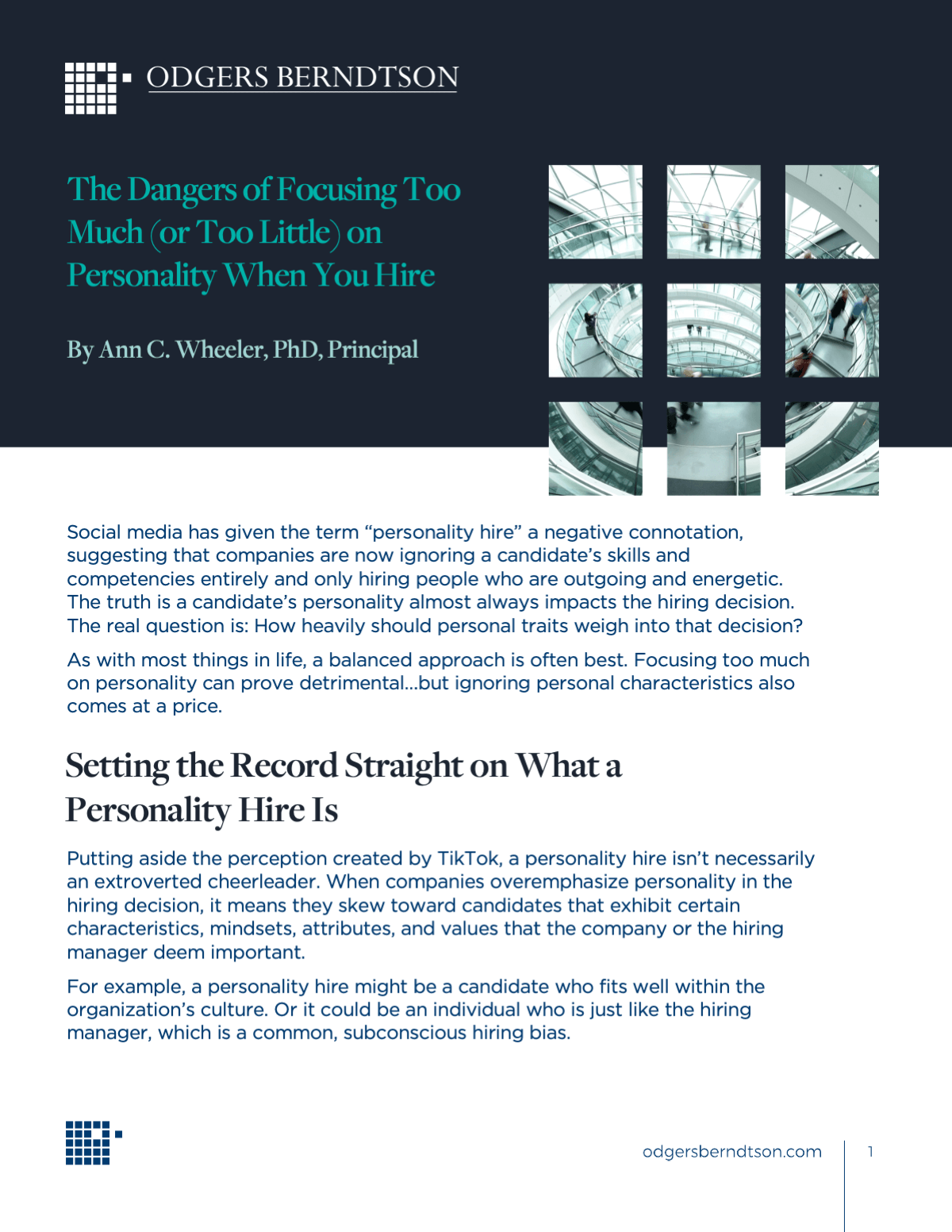Social media has given the term “personality hire” a negative connotation, suggesting that companies are now ignoring a candidate’s skills and competencies entirely and only hiring people who are outgoing and energetic. The truth is a candidate’s personality almost always impacts the hiring decision. The real question is: How heavily should personal traits weigh into that decision?
As with most things in life, a balanced approach is often best. Focusing too much on personality can prove detrimental…but ignoring personal characteristics also comes at a price.
Setting the Record Straight on What a Personality Hire Is
Putting aside the perception created by TikTok, a personality hire isn’t necessarily an extroverted cheerleader. When companies overemphasize personality in the hiring decision, it means they skew toward candidates that exhibit certain characteristics, mindsets, attributes, and values that the company or the hiring manager deem important.
For example, a personality hire might be a candidate who fits well within the organization’s culture. Or it could be an individual who is just like the hiring manager, which is a common, subconscious hiring bias.
Regardless, there is no single “type” that defines a personality hire universally, and no single right or wrong answer when it comes to deciding how much emphasis to place on personal attributes. However, skewing too far in either direction will likely pose problems for any organization, when hiring for any role.
The Risks of Weighing Personality Too Much or Too Little
Let’s look at what can happen when a company places too much or not enough emphasis on the candidate’s personality during the evaluation process.
At one end of the spectrum are organizations that only consider the technical skills and experience that are directly applicable to the role they’re filling. An individual who has a stellar resume and checks all the boxes for the required job skills is likely to secure the position, regardless of their personal traits. Yet, there is no shortage of real-world evidence that hard skills and experience aren’t enough to guarantee success on the job.
What happens when a company doesn’t factor personality into the hiring decision?
- You risk hiring a disruptive individual who wreaks havoc without adding value. For example, a leader with exceptional credentials can do significant damage if they’re condescending, controlling, or resistant to change. At some point, their technical capabilities simply don’t matter.
- You can end up with a team that isn’t aligned with your culture or values. Yet, 72 percent of participants in a PwC global survey said culture can help successful change initiatives happen. Conversely, employees who don’t fit your culture or support your values end up working at cross-purposes.
On the other extreme lie the companies that allow a candidate’s personality to overshadow the fact that their skills and experience don’t match up with the role’s requirements. Whether consciously or not, they rationalize the candidate’s shortcomings and focus instead on how well they’ll fit in.
Aside from the fact that this new employee might be in over their head because they lack the skills to do the job, what else happens if you skew too far in this direction?
- Your company begins to attract candidates who all “look” the same. And that discourages a more diverse candidate pool from advancing. Yet, diversity of personality is just as important to an organization’s success as diversity of age, gender, or race.
- Innovation and creativity are stifled. When everyone involved thinks the same, it generally leads to missed opportunities and poor decision-making. For instance, a team of big-picture thinkers will likely latch onto ideas without considering the details, like the cost to produce this new concept or whether it will meet customer expectations.
- A look-alike workforce can discourage outliers from speaking up, whether the homogeneity is concentrated in one functional group or company-wide. This often happens when a charismatic leader hires direct reports who are just like him or her, building a silo of “mini-me” personalities that often conflict with their peers in other functions.
- If you primarily hire extroverts (as social media suggests is happening), you’ll find their voices dominating the conversation, often leaving others little time to think and reflect. Eventually, any introverts in the group will stop trying to contribute and even leave the company, taking their talents with them.
Focusing too much or too little on personality is especially problematic when filling leadership roles. In today’s volatile world, the most successful leaders exhibit personality attributes like agility, adaptability, open-mindedness, and resilience. Yet, some leadership roles in certain industries also require specific experience and technical skills. Without the right balance, you risk hiring a leader who isn’t equipped to succeed.
These Best Practices Can Help
How can organizations maintain balance when weighing the importance of a candidate’s personality during the hiring process? In our experience advising companies across a wide range of industries, the following measures can help avoid the pitfalls of veering too far in either direction.
- Be open-minded in developing job requirements. When talent is in short supply, broader competencies and personality traits often become just as important as technical skills, if not more so. Consider whether certain hard skills and experiences are truly must-haves or nice-to-haves for the specific role. Then layer in the soft skills and personality traits that are essential for success in the position.
- Use a structured interview process. Without structure, interviewers can get caught up in developing rapport and end up favoring a candidate they like personally (or succumbing to other hiring biases). A structured interview process involves carefully crafting questions, asking them consistently across all candidates, and taking detailed notes that will guide the evaluation step later.
- Involve multiple interviewers, as a panel or sequentially. Some companies even bring in employees who represent the role’s internal customers. By using multiple interviewers, you tap broader perspectives.
- Broaden the candidate pool. With talent increasingly difficult to find, it’s important to look beyond the same sources you’ve typically considered. Casting a wider net is likely to yield a more diverse group of candidates, both from an experience and personality standpoint.
Personality is only one facet to consider during the complex undertaking of hiring the right person for the job. However, by keeping it in proper balance, organizations can increase the odds of selecting the candidate most likely to succeed in the role.
The Leadership Advisory Practice at Odgers Berndtson helps organizations discover and develop leaders, strengthen value-creating teams, and prepare for what’s next. Learn how our highly experienced assessors and coaches can help you and your team make a positive impact on your organization and those around you.

Download this Article
The Dangers Of Focusing Too Much (Or Too Little) On Personality When You Hire
Never miss an issue.
Subscribe to our global magazine to hear our latest insights, opinions, and featured articles.
Follow us
Join us on our social media channels and see how we’re addressing today’s biggest issues.



